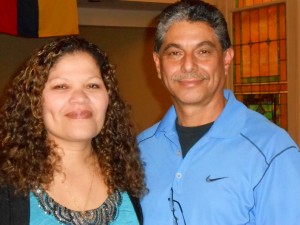Submitted by Anne H. Oman
Reporter At Large

It’s five o’clock on the last Saturday in March, and people are hurrying into the community center of The Promised Land Church on North Fifth Street carrying foil pans heavy with carne asada, pozole, arroz con frijoles. Tostadas, pork ribs, chicken tamales and other dishes from Mexico, Honduras, El Salvador, Puerto Rico, and Uruguay. Welcome to the monthly International Dinner of La Tierra Prometida, a church that serves the temporal and spiritual needs of Latinos and others. It’s a party with a purpose: to raise money to buy the building the church now leases from the First Baptist Church, which moved to larger quarters on South Eighth Street.
“We’ve raised about $30,000 so far, and our goal is to raise $100,000 as a down payment,” says Pastor Carlos Serrano, who was born in Puerto Rico, grew up in New Jersey and came to Fernandina Beach in 2002. No admission is charged, but most diners insert donations, large or small, into a big glass jar at the entrance to the hall. Although Pastor Serrano came to Fernandina to minister to the Spanish-speaking community, (“There was no Spanish church here.”), he stresses that “our doors are open to everyone,” and at least half of the dinner attendees are non-Latinos.

“I love this place – it’s so full of God’s spirit,” says Fernandina Beach resident Karon Hardegree, joining the line and piling a paper plate with offerings from various countries. Marisol Manzo, who came to the Fernandina Beach when she was nine and now works as a teller at the Bank of America, dishes up broccoli, green beans and potatoes in the style of her native El Salvador. Graciela Torres, who is originally from Mexico and now works at the Mexican Store and Home Depot and sometimes cleans houses (“I need to pay bills.”), offers beans and rice and tacos with beef and a piquant green sauce. Mabel Mansueti and Antonio Aguilar serve up pork ribs, potatoes and chicken with rice and vegetables, specialties of their native Uruguay. Bianca Franiciek, the grown-up daughter of Pastor and Mrs. Serrano, puts out slices of tres leches cake, a dessert popular all over Latin America. Juan Berel Perez, who works in the breakfast room at the Days Inn on Sadler Road, proudly displays chicken mole, a specialty of his native Mexico.
“I bought mole sauce at the Mexican Store and then I added onions, tomatoes, red pepper, garlic and sofrito,” he explains.

“We came because Juan told us about it,” says Evelyn Merciana, who is originally from Venezuela but lives in Atlanta and is vacationing at the Days Inn where Mr. Perez works. Ms. Merciana, and her friend Catalina Scurso are chatting in Spanish with Osvaldo “Pepe” Velazquez, who is wearing a gold earring with a cross in it and who runs his own painting company.
“I am fifty-fifty,” he shrugs. “Sometimes I come here. Sometimes I go to the Catholic church. God is God.”
Barbara Dunn, who sits on the Missionary Committee of the First Presbyterian Church, heard about the dinners during a presentation by Pastor Serrano and his wife.
“They’re saints,” she says. “I go every time I can.”
Whitney, a second grader at Southside Elementary School twirls around in her black-and-white striped taffeta dress, while her father, Jose Zambrano, who is from Honduras, spoons rice into the mouth of his two-year-old daughter Gabriela, and chats with Francisco, a Mexican-American who wears a polo shirt bearing the logo of the Ritz-Carlton, where he works as a dishwasher.
Damon Neely stands by a table piled with boxes of his “Friendship Fudge”
“I started coming here about six months ago –you can really feel God’s love here,” says Mr. Neely, who is originally from Pittsburgh and who works in house maintenance. “I told Pastor Carlos that I don’t have any money but I can make fudge.”
“I wish someone would help them buy this church, “ says another diner, Donna McPherson of Belleville, Ontario, who winters in Fernandina Beach.
By about 7:30 at least a hundred people have filed through the food line and left money in the jar and many of them have sampled and bought the fudge and left an additional donation, bringing the goal of purchasing the building a little closer. With the dinner winding down, Pastor Serrano and his wife, Zayda, take a few minutes to sit in a pew in the sanctuary and talk about the mission of The Promised Land. A baby girl, prettily dressed in pink, sleeps in the pew in a carrier.
“Her mother called me,” explains Zayda Serrano. “Her baby sitting fell through. If she can’t go to work….”
But the Serranos provide far more than emergency babysitting. They work with the Florida Department of Children and Families to help people get food stamps, register for Medicaid and other benefits. They provide tutoring and after-school care and help with homework. They drive people to doctors’ appointments, job interviews and court hearings. They arrange for legal services, and provide food, clothing, English and Spanish lessons and martial arts instruction. They sponsor Alcoholics Anonymous meetings and drug counseling, and hold services in both English and Spanish.
“Most Hispanics come to the United States with the expectation that this is the land of opportunity,” says Pastor Serrano. “Then they get slapped in the face, because of lack of money, lack of education. The promised land has let them down. We take care of their physical needs first, and tell them that the most important thing is the spiritual, that we have the promised land right here in church.”
Editor’s Note: Anne H. Oman recently relocated to Fernandina Beach from Washington, D.C. Her articles have appeared in The Washington Post, The Washington Star, The Washington Times, Family Circle and other publications.
April 3, 2013 1:00 a.m.
